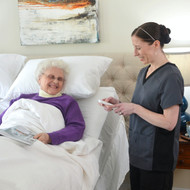Which Homecare Bed Is Suitable For Me?
Posted by Susan T. on Apr 16th 2024
Choosing the right homecare bed is crucial for ensuring comfort, safety, and effective care, especially if you or a loved one requires prolonged bed rest. This decision can be daunting given the myriad of options available, each designed to address different medical needs and home environments.
In this blog post, we'll guide you through the key factors to consider when selecting a homecare bed, including adjustability, support, ease of use, and additional features that cater to specific health conditions. Whether you're recovering from surgery, managing a chronic illness, or caring for an elderly family member, the right bed can significantly enhance your quality of life. By the end of this article, you'll be equipped with the knowledge to make an informed decision about the best homecare bed for your needs
Factors to consider when choosing a homecare bed
Adjustability
Different parts of a homecare bed such as the head, foot, and middle of the bed can be raised or lowered as required, so the patient can be positioned for a good night’s sleep or before a therapy session.
Adjustable beds can help users manage various healthconditions. For example, if a person is trying to deal with respiratory issues, underwent surgery recently, or has acid reflux, they can use the features of their adjustable bed to elevate their head to avoid discomfort and prevent their symptoms from getting worse. People with health conditions that cause swelling or affect circulation can adjust their beds to elevate their legs, allowing blood to circulate back to the heart.
Mobility and Transfer Assistance
Homecare beds are equipped with rails that offer crucial support for safely entering and exiting the bed. Many models also include adjustable lifting mechanisms that allow the bed’s height to be altered. This feature is particularly beneficial for the safe transfer of patients to and from the bed, minimizing the risk of injury.
Additionally, the adjustable height mechanism enables users to lower the bed to a comfortable level for easily reaching items close by. For caregivers, this function proves invaluable. It allows them to elevate the bed to a suitable height before performing tasks such as feeding or bathing a patient. This adjustability ensures that caregivers can work comfortably without straining their backs, promoting a safer and more efficient care environment.
Specialized Mattresses
Many homecare beds use mattresses designed to reduce pressure on different body parts and to prevent bedsores. Some common types of specialized mattresses utilized by homecare beds include air, foam, and gel mattresses.
Safety Features
Many hospital beds are equipped with safety features such as fall prevention sides and call buttons integrated into side rails. Call buttons can be accessed easily regardless of the bed configuration.
Types of Homecare Beds
There are several types of homecare beds available, each with different features to cater to the various needs of users. Here are some popular types of homecare beds.
Standard Hospital Beds
These beds are akin to those found in hospitals but are tailored for patients recuperating at home. The height, head, and foot of a standard hospital bed can be adjusted to suit individual needs. This flexibility can be achieved either manually or through electronic controls, enhancing comfort and aiding in the recovery process.
Low Beds
These are designed for patients with a high risk of falling out of bed. Their height can be reduced to minimize the risk of a serious injury if a fall occurs.
Bariatric Beds
These types of beds are specially designed to accommodate larger patients. They typically have a wider and sturdier frame and heavy-duty motors designed to raise, lower, and adjust them.
Semi-Electric Beds
The motor of a semi-electric bed is designed to adjust its head and foot, but not height (this can be adjusted manually).
Hi-Low Beds
The entire surface of a Hi-low bed can be raised or lowered off the floor. Hi-low beds simplify caregiving and help patients avoid accidents when getting in and out of them.
Specialty Beds
Specialty beds boast additional features such as built-in scales, integrated bed exit alarms, or rotation/turning capabilities to help prevent pressure sores from occurring, especially in patients with severe mobility impairments.
Choosing a Homecare Bed
When choosing a homecare bed, consider the specific needs of the user, and keep the following traits in mind.
Size and Fit
Ensure the bed fits in the available space, is the right size for the user, and provides enough room for the patient to move comfortably.
Safety Features
Look for a bed with side rails designed to help prevent falls. If the bed will be moved frequently, make sure it has lockable wheels.
Ease of use
Make sure the bed you are considering has easy-to-use controls, so even a person who does not know how the bed works can adjust its height easily.
Mattress Compatibility
Some people, especially those with joint or back problems may need specially designed mattresses that provide extra support. The bed you choose should be compatible with the type of mattress needed.
Durability
Look for a bed made of high-quality, sturdy materials known to stand the test of time
Mobility Masters is a renowned supplier of homecare beds. Our beds come equipped with a range of features designed to maximize user comfort and convenience. To learn more, call 800-936-7006.




